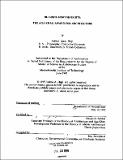| dc.contributor.advisor | Nasser O. Rabbat. | en_US |
| dc.contributor.author | Hirji, Fatima Amir | en_US |
| dc.date.accessioned | 2005-08-17T18:42:24Z | |
| dc.date.available | 2005-08-17T18:42:24Z | |
| dc.date.copyright | 1995 | en_US |
| dc.date.issued | 1995 | en_US |
| dc.identifier.uri | http://hdl.handle.net/1721.1/11453 | |
| dc.description | Thesis (M.S.)--Massachusetts Institute of Technology, Dept. of Architecture, 1995. | en_US |
| dc.description | Includes bibliographical references (leaves 66-68). | en_US |
| dc.description.abstract | The Aga Khan Award for Architecture (AKAA) is an architectural award instituted by His Highness Karim Aga Khan to recognize the achievements of architects, planners, and community organizations that have contributed to architecture in the Muslim world. The scope of the AKAA enterprise is vast and informed by a vision that builds on establishing a critical foundation for the project of rethinking architecture for Muslim societies. That vision began with a challenge set by His Highness which simply asked, "What is the physical environment that Muslims should seek for themselves and for future generations in their homelands?" This question set into motion a diverse set of activities under the aegis of the Award, one of which was the establishment of a forum for debate, the AKAA seminars, to struggle with the intellectual groundwork needed to confront the challenges of the built environment in Muslim societies. Through a critical review and analysis of the issues raised within these seminars, this thesis examines the intellectual concerns of the AKAA and attempts to show how the formulation of these concerns have evolved over the last two decades. The results of this study show that in attempting to become a voice for issues revolving around the built environment of Muslim societies, the AKAA has generated a mediating discourse that integrates the rich architectural heritage of the Islamic world with the technological advances of modernity. However, as a strategy to deal with the impact of modernity within the Muslim world, the intellectual debate stops short of challenging the social and ideological structures within Muslim societies itself that have contributed to problems related to modernization and its impact on the built environment. | en_US |
| dc.description.statementofresponsibility | by Fatima Amir Hirji. | en_US |
| dc.format.extent | 68 leaves | en_US |
| dc.format.extent | 5364547 bytes | |
| dc.format.extent | 5364305 bytes | |
| dc.format.mimetype | application/pdf | |
| dc.format.mimetype | application/pdf | |
| dc.language.iso | eng | en_US |
| dc.publisher | Massachusetts Institute of Technology | en_US |
| dc.rights | M.I.T. theses are protected by copyright. They may be viewed from this source for any purpose, but reproduction or distribution in any format is prohibited without written permission. See provided URL for inquiries about permission. | en_US |
| dc.rights.uri | http://dspace.mit.edu/handle/1721.1/7582 | |
| dc.subject | Architecture | en_US |
| dc.title | Building new thoughts : the Aga Kahn Award for Architecture | en_US |
| dc.title.alternative | Aga Kahn Award for Architecture | en_US |
| dc.type | Thesis | en_US |
| dc.description.degree | M.S. | en_US |
| dc.contributor.department | Massachusetts Institute of Technology. Department of Architecture | |
| dc.identifier.oclc | 33342188 | en_US |
